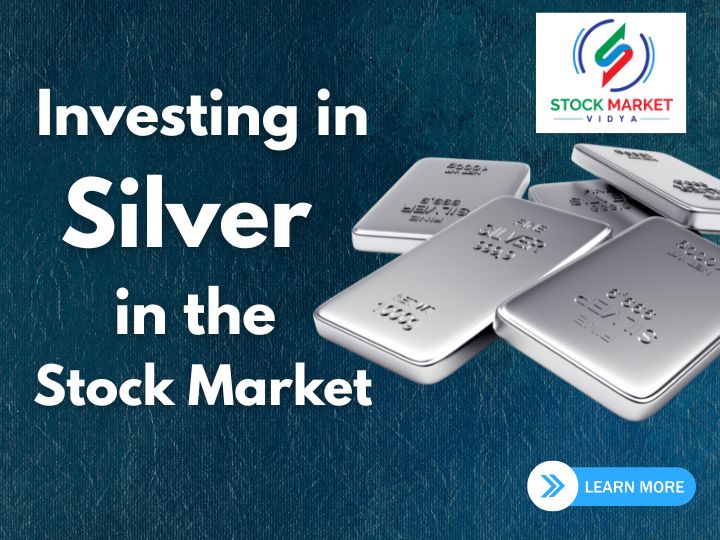Why Silver is More Than Just a Precious Metal
When most people think of precious metals, gold often takes center stage. But there’s another shining star in the world of commodities — Silver. Investing in silver in the stock market is not just about buying shiny coins or jewelry. It’s a powerful tool for wealth protection, portfolio diversification, and even speculative gains.
At Stock Market Vidya, Nagpur, where we help individuals master practical share market strategies through expert stock market training, this topic is often explored in-depth during our share market courses. So, whether you’re a complete beginner or already trading, learning how to invest in silver can add another layer of depth to your investing journey.
What Makes Silver a Smart Investment?
1. Intrinsic Value and Historical Importance
Silver has been used as a form of money for thousands of years. Unlike paper currencies, silver carries intrinsic value. It’s tangible, finite, and globally recognized. Investors often turn to silver during times of economic uncertainty, geopolitical tension, and inflation.
2. Affordability Compared to Gold
Gold is often out of reach for small retail investors due to its high price. Silver, on the other hand, is more affordable, allowing investors with smaller budgets to gain exposure to precious metals markets. You can get started with silver investing even with a modest investment.
3. Dual Nature: Industrial and Precious Metal
Silver is unique because it’s both a precious metal and an industrial metal. It’s widely used in electronics, solar panels, batteries, and medical equipment. This dual demand helps maintain its value and relevance in a modern economy.
Different Ways to Invest in Silver in the Stock Market
1. Silver ETFs (Exchange-Traded Funds)
If you’re looking for a hassle-free and liquid way to invest in silver, Silver ETFs are a popular option. These funds track the price of silver and trade like stocks on the exchange. You don’t own physical silver, but your investment reflects silver price movements.
Examples:
- Nippon India Silver ETF
- ICICI Prudential Silver ETF
These are ideal for investors who want exposure to silver without the logistics of storage and security.
2. Silver Mining Stocks
When you buy shares of companies involved in silver mining or production, you’re indirectly investing in silver. The performance of these stocks is influenced by silver prices, company management, and mining efficiency.
Some Indian companies have exposure to precious metals, and global mining giants are also accessible via international trading platforms. However, these stocks are volatile and better suited for investors with knowledge of the sector.
3. Silver Futures and Options
If you’re a seasoned trader, silver derivatives like futures and options can provide opportunities to trade silver with leverage. These instruments are riskier but offer higher potential rewards.
However, these are advanced tools, and you must understand risk management strategies, which we cover in our stock market course in Nagpur.
4. Sovereign Silver Bonds and E-Silver
Some exchanges in India offer E-Silver, where silver is held electronically in a demat account. Products like these are secure, regulated, and can be traded like shares.
Why Silver Deserves a Place in Your Portfolio
1. Hedge Against Inflation
Silver acts as a hedge against currency devaluation and inflation. As the value of money declines, the real value of silver tends to go up.
2. Portfolio Diversification
Diversification is a key principle taught in every solid share market course. Silver behaves differently compared to stocks and bonds, making it a great diversifier during market volatility.
3. Potential for Long-Term Gains
While silver prices fluctuate in the short term, the long-term trend remains strong due to increasing industrial demand and limited supply.
4. Crisis Commodity
During economic downturns or market crashes, silver often outperforms risky assets. It is seen as a safe haven, much like gold, providing stability in an investor’s portfolio.
Risks of Investing in Silver: What You Should Know
1. Volatility
Silver is more volatile than gold. Prices can swing drastically within short periods. If you’re not prepared for this volatility, it might affect your investment psychology.
2. No Income Generation
Unlike dividend-paying stocks or interest-bearing bonds, silver doesn’t generate passive income. Its gains are only capital appreciation.
3. Market Timing Challenges
Predicting the right time to enter or exit silver investments can be tough. Emotional decisions can lead to losses. Learning technical analysis and price action techniques from a reputed share market training institute can be helpful.
Silver vs Gold: Should You Choose Both?
While both metals offer similar benefits, silver’s lower price, higher volatility, and industrial uses make it better suited for active investors and short-term traders. Gold remains a more stable store of value for long-term holders.
A good stock market course near you will help you understand how to allocate between these metals based on your goals and risk tolerance.
Common Mistakes to Avoid While Investing in Silver
1. Lack of Research
Blindly investing in silver without understanding market drivers can lead to losses. Always conduct thorough fundamental and technical analysis.
2. Ignoring Diversification
Don’t put all your money into silver just because prices are rising. Spread your investments across various asset classes.
3. Emotional Investing
Emotions like fear and greed often dictate poor decisions. Following a structured trading strategy, like the ones taught in our share market classes in Nagpur, helps build discipline.
Silver in the Indian Context
In India, silver is not just an investment — it’s also a part of tradition. Festivals, weddings, and religious ceremonies often involve silver gifts. This cultural demand keeps silver in circulation and supports price growth.
With products like Silver ETFs and e-Silver offered by Indian exchanges, it’s easier than ever to invest in silver using stock market platforms.
Who Should Invest in Silver?
- New Investors: Those looking for a low-entry investment.
- Traders: Those who enjoy short-term price movements.
- Diversified Investors: Those building a well-rounded portfolio.
- Risk Managers: Those seeking a hedge against market uncertainty.
Whether you’re a student, homemaker, job holder, or entrepreneur — silver can be a wise addition to your wealth-building toolkit.
Learning Silver Investing with Stock Market Vidya, Nagpur
At Stock Market Vidya, we believe in empowering you with knowledge. Our stock market training programs don’t just teach theory — we guide you with real market strategies, tools, and mindset required to invest and trade confidently.
If you’re serious about understanding commodities like silver, equity markets, and modern trading techniques, our share market course in Nagpur is ideal for you.
We also provide expert-led share market classes that cover:
- How to invest in silver and gold through stock market instruments
- Technical analysis and price action strategies
- Trading psychology and risk control
- Portfolio building techniques
Final Thoughts: Shine Your Portfolio with Silver
Silver is no longer just a traditional metal. It’s a modern investment vehicle that offers protection, profit potential, and portfolio balance. Whether you’re a new investor exploring your first asset or a seasoned trader looking for diversification, investing in silver offers a golden (or rather silver) opportunity.
Take the first step toward mastering such smart investments with proper guidance. Enroll in a stock market course near you today at Stock Market Vidya, Nagpur, and build the knowledge foundation that supports long-term financial success.
Call Now: 9822718163 | 8421893845
Visit: www.stockmarketvidya.com
[{"id":708,"link":"https:\/\/stockmarketvidya.com\/blogs\/iron-condor-strategy-explained-learn-smart-options-trading-the-right-way\/","name":"iron-condor-strategy-explained-learn-smart-options-trading-the-right-way","thumbnail":{"url":"https:\/\/stockmarketvidya.com\/blogs\/wp-content\/uploads\/2026\/02\/Iron-Condor-Strategy-Explained-\u2013-1.jpg","alt":"Iron Condor Strategy Explained"},"title":"Iron Condor Strategy Explained \u2013 Learn Smart Options Trading the Right Way","author":{"name":"Share Market Blog","link":"https:\/\/stockmarketvidya.com\/blogs\/author\/share-market-blog\/"},"date":"Feb 5, 2026","dateGMT":"2026-02-05 01:17:00","modifiedDate":"2026-02-04 15:19:56","modifiedDateGMT":"2026-02-04 15:19:56","commentCount":"0","commentStatus":"open","categories":{"coma":"<a href=\"https:\/\/stockmarketvidya.com\/blogs\/category\/share-market\/\" rel=\"category tag\">Share Market<\/a>, <a href=\"https:\/\/stockmarketvidya.com\/blogs\/category\/share-market-course\/\" rel=\"category tag\">Share Market Course<\/a>","space":"<a href=\"https:\/\/stockmarketvidya.com\/blogs\/category\/share-market\/\" rel=\"category tag\">Share Market<\/a> <a href=\"https:\/\/stockmarketvidya.com\/blogs\/category\/share-market-course\/\" rel=\"category tag\">Share Market Course<\/a>"},"taxonomies":{"post_tag":"<a href='https:\/\/stockmarketvidya.com\/blogs\/tag\/advanced-options-trading\/' rel='post_tag'>Advanced Options Trading<\/a><a href='https:\/\/stockmarketvidya.com\/blogs\/tag\/bank-nifty-iron-condor\/' rel='post_tag'>BANK NIFTY Iron Condor<\/a><a href='https:\/\/stockmarketvidya.com\/blogs\/tag\/iron-condor-options-trading\/' rel='post_tag'>Iron Condor Options Trading<\/a><a href='https:\/\/stockmarketvidya.com\/blogs\/tag\/iron-condor-strategy\/' rel='post_tag'>iron condor strategy<\/a><a href='https:\/\/stockmarketvidya.com\/blogs\/tag\/nifty-iron-condor\/' rel='post_tag'>NIFTY Iron Condor<\/a><a href='https:\/\/stockmarketvidya.com\/blogs\/tag\/nism-certified-trainer\/' rel='post_tag'>NISM Certified Trainer<\/a><a href='https:\/\/stockmarketvidya.com\/blogs\/tag\/non-directional-options-strategy\/' rel='post_tag'>Non Directional Options Strategy<\/a><a href='https:\/\/stockmarketvidya.com\/blogs\/tag\/option-selling-strategies\/' rel='post_tag'>Option Selling Strategies<\/a><a href='https:\/\/stockmarketvidya.com\/blogs\/tag\/options-selling-strategy\/' rel='post_tag'>Options selling strategy<\/a><a href='https:\/\/stockmarketvidya.com\/blogs\/tag\/options-trading-course\/' rel='post_tag'>options trading course<\/a><a href='https:\/\/stockmarketvidya.com\/blogs\/tag\/options-trading-for-beginners\/' rel='post_tag'>Options trading for beginners<\/a><a href='https:\/\/stockmarketvidya.com\/blogs\/tag\/professional-options-trading\/' rel='post_tag'>professional options trading<\/a><a href='https:\/\/stockmarketvidya.com\/blogs\/tag\/risk-managed-trading\/' rel='post_tag'>Risk Managed Trading<\/a><a href='https:\/\/stockmarketvidya.com\/blogs\/tag\/share-market-classes-in-nagpur\/' rel='post_tag'>Share Market Classes in Nagpur<\/a><a href='https:\/\/stockmarketvidya.com\/blogs\/tag\/stock-market-training-nagpur\/' rel='post_tag'>stock market training Nagpur<\/a><a href='https:\/\/stockmarketvidya.com\/blogs\/tag\/theta-decay-strategy\/' rel='post_tag'>Theta Decay Strategy<\/a><a href='https:\/\/stockmarketvidya.com\/blogs\/tag\/volatility-trading\/' rel='post_tag'>Volatility Trading<\/a>"},"readTime":{"min":5,"sec":57},"status":"publish","excerpt":""},{"id":704,"link":"https:\/\/stockmarketvidya.com\/blogs\/iron-collar-strategy-explained-smart-risk-control-options-strategy-for-indian-traders\/","name":"iron-collar-strategy-explained-smart-risk-control-options-strategy-for-indian-traders","thumbnail":{"url":"https:\/\/stockmarketvidya.com\/blogs\/wp-content\/uploads\/2026\/02\/Iron-Collar-Strategy-Explained.jpg","alt":"Iron Collar Strategy Explained: Smart Risk Control Options Strategy for Indian Traders"},"title":"Iron Collar Strategy Explained: Smart Risk Control Options Strategy for Indian Traders","author":{"name":"Share Market Blog","link":"https:\/\/stockmarketvidya.com\/blogs\/author\/share-market-blog\/"},"date":"Feb 3, 2026","dateGMT":"2026-02-03 10:48:33","modifiedDate":"2026-02-03 10:48:34","modifiedDateGMT":"2026-02-03 10:48:34","commentCount":"0","commentStatus":"open","categories":{"coma":"<a href=\"https:\/\/stockmarketvidya.com\/blogs\/category\/share-market\/\" rel=\"category tag\">Share Market<\/a>, <a href=\"https:\/\/stockmarketvidya.com\/blogs\/category\/share-market-course\/\" rel=\"category tag\">Share Market Course<\/a>","space":"<a href=\"https:\/\/stockmarketvidya.com\/blogs\/category\/share-market\/\" rel=\"category tag\">Share Market<\/a> <a href=\"https:\/\/stockmarketvidya.com\/blogs\/category\/share-market-course\/\" rel=\"category tag\">Share Market Course<\/a>"},"taxonomies":{"post_tag":"<a href='https:\/\/stockmarketvidya.com\/blogs\/tag\/advanced-options-strategies\/' rel='post_tag'>Advanced Options Strategies<\/a><a href='https:\/\/stockmarketvidya.com\/blogs\/tag\/best-share-market-classes-in-nagpur\/' rel='post_tag'>Best share market classes in Nagpur<\/a><a href='https:\/\/stockmarketvidya.com\/blogs\/tag\/capital-protection-strategy\/' rel='post_tag'>capital protection strategy<\/a><a href='https:\/\/stockmarketvidya.com\/blogs\/tag\/defined-risk-trading\/' rel='post_tag'>defined risk trading<\/a><a href='https:\/\/stockmarketvidya.com\/blogs\/tag\/hedged-options-trading\/' rel='post_tag'>hedged options trading<\/a><a href='https:\/\/stockmarketvidya.com\/blogs\/tag\/indian-stock-market-options\/' rel='post_tag'>Indian stock market options<\/a><a href='https:\/\/stockmarketvidya.com\/blogs\/tag\/iron-collar-options-strategy\/' rel='post_tag'>iron collar options strategy<\/a><a href='https:\/\/stockmarketvidya.com\/blogs\/tag\/iron-collar-strategy\/' rel='post_tag'>iron collar strategy<\/a><a href='https:\/\/stockmarketvidya.com\/blogs\/tag\/limited-risk-options-strategy\/' rel='post_tag'>limited risk options strategy<\/a><a href='https:\/\/stockmarketvidya.com\/blogs\/tag\/option-selling-strategy\/' rel='post_tag'>option selling strategy<\/a><a href='https:\/\/stockmarketvidya.com\/blogs\/tag\/options-hedging-strategy\/' rel='post_tag'>options hedging strategy<\/a><a href='https:\/\/stockmarketvidya.com\/blogs\/tag\/options-trading-course-nagpur\/' rel='post_tag'>options trading course Nagpur<\/a><a href='https:\/\/stockmarketvidya.com\/blogs\/tag\/options-trading-for-beginners\/' rel='post_tag'>Options trading for beginners<\/a><a href='https:\/\/stockmarketvidya.com\/blogs\/tag\/options-trading-in-india\/' rel='post_tag'>Options Trading in India<\/a><a href='https:\/\/stockmarketvidya.com\/blogs\/tag\/options-trading-strategy\/' rel='post_tag'>Options trading strategy<\/a><a href='https:\/\/stockmarketvidya.com\/blogs\/tag\/prashant-sarode-nism-certified\/' rel='post_tag'>Prashant Sarode NISM certified<\/a><a href='https:\/\/stockmarketvidya.com\/blogs\/tag\/professional-options-trading\/' rel='post_tag'>professional options trading<\/a><a href='https:\/\/stockmarketvidya.com\/blogs\/tag\/risk-control-in-options-trading\/' rel='post_tag'>risk control in options trading<\/a><a href='https:\/\/stockmarketvidya.com\/blogs\/tag\/rule-based-trading\/' rel='post_tag'>rule based trading<\/a><a href='https:\/\/stockmarketvidya.com\/blogs\/tag\/share-market-training-in-nagpur\/' rel='post_tag'>share market training in Nagpur<\/a><a href='https:\/\/stockmarketvidya.com\/blogs\/tag\/share-trading-classes-in-nagpur\/' rel='post_tag'>share trading classes in Nagpur<\/a><a href='https:\/\/stockmarketvidya.com\/blogs\/tag\/sideways-market-options-strategy\/' rel='post_tag'>sideways market options strategy<\/a><a href='https:\/\/stockmarketvidya.com\/blogs\/tag\/smart-options-trading\/' rel='post_tag'>smart options trading<\/a><a href='https:\/\/stockmarketvidya.com\/blogs\/tag\/stock-market-course-in-nagpur\/' rel='post_tag'>stock market course in Nagpur<\/a><a href='https:\/\/stockmarketvidya.com\/blogs\/tag\/stock-market-training\/' rel='post_tag'>Stock Market Training<\/a><a href='https:\/\/stockmarketvidya.com\/blogs\/tag\/stock-market-vidya-nagpur\/' rel='post_tag'>Stock Market Vidya Nagpur<\/a><a href='https:\/\/stockmarketvidya.com\/blogs\/tag\/stock-options-trading\/' rel='post_tag'>stock options trading<\/a><a href='https:\/\/stockmarketvidya.com\/blogs\/tag\/trading-psychology\/' rel='post_tag'>Trading Psychology<\/a>"},"readTime":{"min":5,"sec":58},"status":"publish","excerpt":""},{"id":696,"link":"https:\/\/stockmarketvidya.com\/blogs\/bear-put-spread-strategy-explained-a-smart-options-trading-method-for-falling-markets\/","name":"bear-put-spread-strategy-explained-a-smart-options-trading-method-for-falling-markets","thumbnail":{"url":"https:\/\/stockmarketvidya.com\/blogs\/wp-content\/uploads\/2026\/01\/Bear-Put-Spread-Strategy-Explained.jpg","alt":"Bear Put Spread Strategy - Stock Marketing Training Nagpur"},"title":"Bear Put Spread Strategy Explained: A Smart Options Trading Method for Falling Markets","author":{"name":"Share Market Blog","link":"https:\/\/stockmarketvidya.com\/blogs\/author\/share-market-blog\/"},"date":"Jan 31, 2026","dateGMT":"2026-01-31 01:00:00","modifiedDate":"2026-01-30 14:47:36","modifiedDateGMT":"2026-01-30 14:47:36","commentCount":"0","commentStatus":"open","categories":{"coma":"<a href=\"https:\/\/stockmarketvidya.com\/blogs\/category\/share-market\/\" rel=\"category tag\">Share Market<\/a>, <a href=\"https:\/\/stockmarketvidya.com\/blogs\/category\/share-market-course\/\" rel=\"category tag\">Share Market Course<\/a>","space":"<a href=\"https:\/\/stockmarketvidya.com\/blogs\/category\/share-market\/\" rel=\"category tag\">Share Market<\/a> <a href=\"https:\/\/stockmarketvidya.com\/blogs\/category\/share-market-course\/\" rel=\"category tag\">Share Market Course<\/a>"},"taxonomies":{"post_tag":"<a href='https:\/\/stockmarketvidya.com\/blogs\/tag\/bank-nifty-options\/' rel='post_tag'>Bank Nifty options<\/a><a href='https:\/\/stockmarketvidya.com\/blogs\/tag\/bear-put-spread\/' rel='post_tag'>Bear Put Spread<\/a><a href='https:\/\/stockmarketvidya.com\/blogs\/tag\/bear-put-spread-strategy\/' rel='post_tag'>Bear Put Spread Strategy<\/a><a href='https:\/\/stockmarketvidya.com\/blogs\/tag\/bearish-options-strategy\/' rel='post_tag'>Bearish Options Strategy<\/a><a href='https:\/\/stockmarketvidya.com\/blogs\/tag\/best-share-market-classes-in-nagpur\/' rel='post_tag'>Best share market classes in Nagpur<\/a><a href='https:\/\/stockmarketvidya.com\/blogs\/tag\/nifty-options-strategy\/' rel='post_tag'>Nifty Options Strategy<\/a><a href='https:\/\/stockmarketvidya.com\/blogs\/tag\/options-trading-basics\/' rel='post_tag'>Options trading basics<\/a><a href='https:\/\/stockmarketvidya.com\/blogs\/tag\/options-trading-for-beginners\/' rel='post_tag'>Options trading for beginners<\/a><a href='https:\/\/stockmarketvidya.com\/blogs\/tag\/options-trading-strategy\/' rel='post_tag'>Options trading strategy<\/a><a href='https:\/\/stockmarketvidya.com\/blogs\/tag\/professional-trading-strategies\/' rel='post_tag'>Professional Trading Strategies<\/a><a href='https:\/\/stockmarketvidya.com\/blogs\/tag\/share-market-classes\/' rel='post_tag'>Share Market Classes<\/a><a href='https:\/\/stockmarketvidya.com\/blogs\/tag\/share-market-course\/' rel='post_tag'>Share Market Course<\/a><a href='https:\/\/stockmarketvidya.com\/blogs\/tag\/share-market-course-in-nagpur\/' rel='post_tag'>Share Market Course in Nagpur<\/a><a href='https:\/\/stockmarketvidya.com\/blogs\/tag\/share-market-training\/' rel='post_tag'>Share Market Training<\/a><a href='https:\/\/stockmarketvidya.com\/blogs\/tag\/share-market-training-in-nagpur\/' rel='post_tag'>share market training in Nagpur<\/a><a href='https:\/\/stockmarketvidya.com\/blogs\/tag\/share-trading-classes-in-nagpur\/' rel='post_tag'>share trading classes in Nagpur<\/a><a href='https:\/\/stockmarketvidya.com\/blogs\/tag\/stock-market-course\/' rel='post_tag'>Stock Market Course<\/a><a href='https:\/\/stockmarketvidya.com\/blogs\/tag\/stock-market-training\/' rel='post_tag'>Stock Market Training<\/a><a href='https:\/\/stockmarketvidya.com\/blogs\/tag\/stock-market-vidya\/' rel='post_tag'>Stock Market Vidya<\/a>"},"readTime":{"min":9,"sec":19},"status":"publish","excerpt":""},{"id":689,"link":"https:\/\/stockmarketvidya.com\/blogs\/covered-call-strategy-explained-how-indian-traders-earn-regular-income-from-the-stock-market\/","name":"covered-call-strategy-explained-how-indian-traders-earn-regular-income-from-the-stock-market","thumbnail":{"url":"https:\/\/stockmarketvidya.com\/blogs\/wp-content\/uploads\/2026\/01\/The-investment-guide-Learn-about-how-to-deal-with-the-crisis-Learn-about-how-to-analyze-opportunities.jpg","alt":"Covered Call Strategy Explained"},"title":"Covered Call Strategy Explained: How Indian Traders Earn Regular Income from the Stock Market","author":{"name":"Share Market Blog","link":"https:\/\/stockmarketvidya.com\/blogs\/author\/share-market-blog\/"},"date":"Jan 29, 2026","dateGMT":"2026-01-29 05:20:19","modifiedDate":"2026-01-29 05:23:02","modifiedDateGMT":"2026-01-29 05:23:02","commentCount":"0","commentStatus":"open","categories":{"coma":"<a href=\"https:\/\/stockmarketvidya.com\/blogs\/category\/share-market\/\" rel=\"category tag\">Share Market<\/a>, <a href=\"https:\/\/stockmarketvidya.com\/blogs\/category\/share-market-course\/\" rel=\"category tag\">Share Market Course<\/a>","space":"<a href=\"https:\/\/stockmarketvidya.com\/blogs\/category\/share-market\/\" rel=\"category tag\">Share Market<\/a> <a href=\"https:\/\/stockmarketvidya.com\/blogs\/category\/share-market-course\/\" rel=\"category tag\">Share Market Course<\/a>"},"taxonomies":{"post_tag":"<a href='https:\/\/stockmarketvidya.com\/blogs\/tag\/best-share-market-classes-in-nagpur\/' rel='post_tag'>Best share market classes in Nagpur<\/a><a href='https:\/\/stockmarketvidya.com\/blogs\/tag\/covered-call-options\/' rel='post_tag'>Covered Call Options<\/a><a href='https:\/\/stockmarketvidya.com\/blogs\/tag\/covered-call-strategy\/' rel='post_tag'>Covered Call Strategy<\/a><a href='https:\/\/stockmarketvidya.com\/blogs\/tag\/income-strategy-in-stock-market\/' rel='post_tag'>Income Strategy in Stock Market<\/a><a href='https:\/\/stockmarketvidya.com\/blogs\/tag\/nism-certified-trainer\/' rel='post_tag'>NISM Certified Trainer<\/a><a href='https:\/\/stockmarketvidya.com\/blogs\/tag\/options-trading-for-beginners\/' rel='post_tag'>Options trading for beginners<\/a><a href='https:\/\/stockmarketvidya.com\/blogs\/tag\/options-trading-india\/' rel='post_tag'>Options trading India<\/a><a href='https:\/\/stockmarketvidya.com\/blogs\/tag\/options-trading-strategy\/' rel='post_tag'>Options trading strategy<\/a><a href='https:\/\/stockmarketvidya.com\/blogs\/tag\/prashant-sarode\/' rel='post_tag'>Prashant Sarode<\/a><a href='https:\/\/stockmarketvidya.com\/blogs\/tag\/share-market-classes\/' rel='post_tag'>Share Market Classes<\/a><a href='https:\/\/stockmarketvidya.com\/blogs\/tag\/share-market-course\/' rel='post_tag'>Share Market Course<\/a><a href='https:\/\/stockmarketvidya.com\/blogs\/tag\/share-market-course-in-nagpur\/' rel='post_tag'>Share Market Course in Nagpur<\/a><a href='https:\/\/stockmarketvidya.com\/blogs\/tag\/share-market-training\/' rel='post_tag'>Share Market Training<\/a><a href='https:\/\/stockmarketvidya.com\/blogs\/tag\/share-market-training-in-nagpur\/' rel='post_tag'>share market training in Nagpur<\/a><a href='https:\/\/stockmarketvidya.com\/blogs\/tag\/share-trading-classes-in-nagpur\/' rel='post_tag'>share trading classes in Nagpur<\/a><a href='https:\/\/stockmarketvidya.com\/blogs\/tag\/stock-market-course\/' rel='post_tag'>Stock Market Course<\/a><a href='https:\/\/stockmarketvidya.com\/blogs\/tag\/stock-market-training\/' rel='post_tag'>Stock Market Training<\/a><a href='https:\/\/stockmarketvidya.com\/blogs\/tag\/stock-market-vidya-nagpur\/' rel='post_tag'>Stock Market Vidya Nagpur<\/a>"},"readTime":{"min":9,"sec":36},"status":"publish","excerpt":""},{"id":677,"link":"https:\/\/stockmarketvidya.com\/blogs\/bear-call-spread-strategy-explained-a-smart-options-trading-method-for-sideways-to-falling-markets\/","name":"bear-call-spread-strategy-explained-a-smart-options-trading-method-for-sideways-to-falling-markets","thumbnail":{"url":"https:\/\/stockmarketvidya.com\/blogs\/wp-content\/uploads\/2026\/01\/Bear-Call-Spread-Strategy11.jpg","alt":"Bear-Call-Spread-Strategy"},"title":"Bear Call Spread Strategy Explained: A Smart Options Trading Method for Sideways to Falling Markets","author":{"name":"Share Market Blog","link":"https:\/\/stockmarketvidya.com\/blogs\/author\/share-market-blog\/"},"date":"Jan 24, 2026","dateGMT":"2026-01-24 12:21:15","modifiedDate":"2026-01-27 10:12:22","modifiedDateGMT":"2026-01-27 10:12:22","commentCount":"0","commentStatus":"open","categories":{"coma":"<a href=\"https:\/\/stockmarketvidya.com\/blogs\/category\/share-market\/\" rel=\"category tag\">Share Market<\/a>, <a href=\"https:\/\/stockmarketvidya.com\/blogs\/category\/share-market-course\/\" rel=\"category tag\">Share Market Course<\/a>","space":"<a href=\"https:\/\/stockmarketvidya.com\/blogs\/category\/share-market\/\" rel=\"category tag\">Share Market<\/a> <a href=\"https:\/\/stockmarketvidya.com\/blogs\/category\/share-market-course\/\" rel=\"category tag\">Share Market Course<\/a>"},"taxonomies":{"post_tag":"<a href='https:\/\/stockmarketvidya.com\/blogs\/tag\/advanced-options-strategies\/' rel='post_tag'>Advanced Options Strategies<\/a><a href='https:\/\/stockmarketvidya.com\/blogs\/tag\/bear-call-spread\/' rel='post_tag'>Bear Call Spread<\/a><a href='https:\/\/stockmarketvidya.com\/blogs\/tag\/bear-call-spread-strategy\/' rel='post_tag'>Bear Call Spread Strategy<\/a><a href='https:\/\/stockmarketvidya.com\/blogs\/tag\/bearish-market-strategy\/' rel='post_tag'>Bearish Market Strategy<\/a><a href='https:\/\/stockmarketvidya.com\/blogs\/tag\/bearish-options-strategy\/' rel='post_tag'>Bearish Options Strategy<\/a><a href='https:\/\/stockmarketvidya.com\/blogs\/tag\/call-option-selling\/' rel='post_tag'>Call Option Selling<\/a><a href='https:\/\/stockmarketvidya.com\/blogs\/tag\/credit-spread-strategy\/' rel='post_tag'>Credit spread strategy<\/a><a href='https:\/\/stockmarketvidya.com\/blogs\/tag\/derivatives-trading\/' rel='post_tag'>Derivatives Trading<\/a><a href='https:\/\/stockmarketvidya.com\/blogs\/tag\/nism-options-trading\/' rel='post_tag'>NISM Options Trading<\/a><a href='https:\/\/stockmarketvidya.com\/blogs\/tag\/option-spread-strategy\/' rel='post_tag'>Option Spread Strategy<\/a><a href='https:\/\/stockmarketvidya.com\/blogs\/tag\/options-trading-course\/' rel='post_tag'>options trading course<\/a><a href='https:\/\/stockmarketvidya.com\/blogs\/tag\/options-trading-for-beginners\/' rel='post_tag'>Options trading for beginners<\/a><a href='https:\/\/stockmarketvidya.com\/blogs\/tag\/options-trading-in-india\/' rel='post_tag'>Options Trading in India<\/a><a href='https:\/\/stockmarketvidya.com\/blogs\/tag\/options-trading-strategy\/' rel='post_tag'>Options trading strategy<\/a><a href='https:\/\/stockmarketvidya.com\/blogs\/tag\/risk-limited-strategy\/' rel='post_tag'>Risk Limited Strategy<\/a><a href='https:\/\/stockmarketvidya.com\/blogs\/tag\/share-market-classes-in-nagpur\/' rel='post_tag'>Share Market Classes in Nagpur<\/a><a href='https:\/\/stockmarketvidya.com\/blogs\/tag\/share-market-course\/' rel='post_tag'>Share Market Course<\/a><a href='https:\/\/stockmarketvidya.com\/blogs\/tag\/stock-market-options\/' rel='post_tag'>Stock Market Options<\/a><a href='https:\/\/stockmarketvidya.com\/blogs\/tag\/stock-market-training\/' rel='post_tag'>Stock Market Training<\/a><a href='https:\/\/stockmarketvidya.com\/blogs\/tag\/stock-market-vidya\/' rel='post_tag'>Stock Market Vidya<\/a>"},"readTime":{"min":6,"sec":22},"status":"publish","excerpt":""},{"id":672,"link":"https:\/\/stockmarketvidya.com\/blogs\/what-is-a-bull-put-spread-simple-explanation-with-real-market-logic\/","name":"what-is-a-bull-put-spread-simple-explanation-with-real-market-logic","thumbnail":{"url":"https:\/\/stockmarketvidya.com\/blogs\/wp-content\/uploads\/2026\/01\/What-Is-a-Bull-Put-Spread.jpg","alt":"What Is a Bull Put Spread? share trading classes in Nagpur"},"title":"What Is a Bull Put Spread? Simple Explanation with Real-Market Logic","author":{"name":"Share Market Blog","link":"https:\/\/stockmarketvidya.com\/blogs\/author\/share-market-blog\/"},"date":"Jan 22, 2026","dateGMT":"2026-01-22 13:01:24","modifiedDate":"2026-01-22 13:08:10","modifiedDateGMT":"2026-01-22 13:08:10","commentCount":"0","commentStatus":"open","categories":{"coma":"<a href=\"https:\/\/stockmarketvidya.com\/blogs\/category\/share-market\/\" rel=\"category tag\">Share Market<\/a>, <a href=\"https:\/\/stockmarketvidya.com\/blogs\/category\/share-market-course\/\" rel=\"category tag\">Share Market Course<\/a>","space":"<a href=\"https:\/\/stockmarketvidya.com\/blogs\/category\/share-market\/\" rel=\"category tag\">Share Market<\/a> <a href=\"https:\/\/stockmarketvidya.com\/blogs\/category\/share-market-course\/\" rel=\"category tag\">Share Market Course<\/a>"},"taxonomies":{"post_tag":"<a href='https:\/\/stockmarketvidya.com\/blogs\/tag\/bank-nifty-options\/' rel='post_tag'>Bank Nifty options<\/a><a href='https:\/\/stockmarketvidya.com\/blogs\/tag\/best-share-market-classes-in-nagpur\/' rel='post_tag'>Best share market classes in Nagpur<\/a><a href='https:\/\/stockmarketvidya.com\/blogs\/tag\/bull-put-spread\/' rel='post_tag'>Bull Put Spread<\/a><a href='https:\/\/stockmarketvidya.com\/blogs\/tag\/bull-put-spread-explained\/' rel='post_tag'>Bull Put Spread explained<\/a><a href='https:\/\/stockmarketvidya.com\/blogs\/tag\/bull-put-spread-strategy\/' rel='post_tag'>Bull Put Spread strategy<\/a><a href='https:\/\/stockmarketvidya.com\/blogs\/tag\/credit-spread-strategy\/' rel='post_tag'>Credit spread strategy<\/a><a href='https:\/\/stockmarketvidya.com\/blogs\/tag\/index-options-trading\/' rel='post_tag'>Index options trading<\/a><a href='https:\/\/stockmarketvidya.com\/blogs\/tag\/indian-stock-market-training\/' rel='post_tag'>Indian stock market training<\/a><a href='https:\/\/stockmarketvidya.com\/blogs\/tag\/learn-options-trading\/' rel='post_tag'>Learn options trading<\/a><a href='https:\/\/stockmarketvidya.com\/blogs\/tag\/low-risk-options-strategy\/' rel='post_tag'>low risk options strategy<\/a><a href='https:\/\/stockmarketvidya.com\/blogs\/tag\/nifty-options-trading\/' rel='post_tag'>Nifty options trading<\/a><a href='https:\/\/stockmarketvidya.com\/blogs\/tag\/options-selling-strategy\/' rel='post_tag'>Options selling strategy<\/a><a href='https:\/\/stockmarketvidya.com\/blogs\/tag\/options-trading-basics\/' rel='post_tag'>Options trading basics<\/a><a href='https:\/\/stockmarketvidya.com\/blogs\/tag\/options-trading-classes-in-nagpur\/' rel='post_tag'>options trading classes in Nagpur<\/a><a href='https:\/\/stockmarketvidya.com\/blogs\/tag\/options-trading-for-beginners\/' rel='post_tag'>Options trading for beginners<\/a><a href='https:\/\/stockmarketvidya.com\/blogs\/tag\/options-trading-india\/' rel='post_tag'>Options trading India<\/a><a href='https:\/\/stockmarketvidya.com\/blogs\/tag\/options-trading-strategy\/' rel='post_tag'>Options trading strategy<\/a><a href='https:\/\/stockmarketvidya.com\/blogs\/tag\/put-option-strategy\/' rel='post_tag'>Put option strategy<\/a><a href='https:\/\/stockmarketvidya.com\/blogs\/tag\/share-market-classes\/' rel='post_tag'>Share Market Classes<\/a><a href='https:\/\/stockmarketvidya.com\/blogs\/tag\/share-market-course\/' rel='post_tag'>Share Market Course<\/a><a href='https:\/\/stockmarketvidya.com\/blogs\/tag\/share-market-course-in-nagpur\/' rel='post_tag'>Share Market Course in Nagpur<\/a><a href='https:\/\/stockmarketvidya.com\/blogs\/tag\/share-market-course-near-me\/' rel='post_tag'>share market course near me<\/a><a href='https:\/\/stockmarketvidya.com\/blogs\/tag\/share-market-training\/' rel='post_tag'>Share Market Training<\/a><a href='https:\/\/stockmarketvidya.com\/blogs\/tag\/share-market-training-in-nagpur\/' rel='post_tag'>share market training in Nagpur<\/a><a href='https:\/\/stockmarketvidya.com\/blogs\/tag\/share-trading-classes-in-nagpur\/' rel='post_tag'>share trading classes in Nagpur<\/a><a href='https:\/\/stockmarketvidya.com\/blogs\/tag\/stock-market-course\/' rel='post_tag'>Stock Market Course<\/a><a href='https:\/\/stockmarketvidya.com\/blogs\/tag\/stock-market-education-india\/' rel='post_tag'>stock market education India<\/a><a href='https:\/\/stockmarketvidya.com\/blogs\/tag\/stock-market-training\/' rel='post_tag'>Stock Market Training<\/a><a href='https:\/\/stockmarketvidya.com\/blogs\/tag\/what-is-bull-put-spread\/' rel='post_tag'>What is Bull Put Spread<\/a>"},"readTime":{"min":6,"sec":20},"status":"publish","excerpt":""},{"id":663,"link":"https:\/\/stockmarketvidya.com\/blogs\/top-10-popular-world-indices-every-trader-and-investor-must-know\/","name":"top-10-popular-world-indices-every-trader-and-investor-must-know","thumbnail":{"url":"https:\/\/stockmarketvidya.com\/blogs\/wp-content\/uploads\/2026\/01\/Top-10-Popular-World-Indices-Every-Trader-and-Investor-Must-Know.jpg","alt":"Top 10 Popular World Indices Every Trader and Investor Must Know Nagpur"},"title":"Top 10 Popular World Indices Every Trader and Investor Must Know","author":{"name":"Share Market Blog","link":"https:\/\/stockmarketvidya.com\/blogs\/author\/share-market-blog\/"},"date":"Jan 18, 2026","dateGMT":"2026-01-18 11:19:58","modifiedDate":"2026-01-18 11:44:32","modifiedDateGMT":"2026-01-18 11:44:32","commentCount":"0","commentStatus":"open","categories":{"coma":"<a href=\"https:\/\/stockmarketvidya.com\/blogs\/category\/share-market\/\" rel=\"category tag\">Share Market<\/a>, <a href=\"https:\/\/stockmarketvidya.com\/blogs\/category\/share-market-course\/\" rel=\"category tag\">Share Market Course<\/a>","space":"<a href=\"https:\/\/stockmarketvidya.com\/blogs\/category\/share-market\/\" rel=\"category tag\">Share Market<\/a> <a href=\"https:\/\/stockmarketvidya.com\/blogs\/category\/share-market-course\/\" rel=\"category tag\">Share Market Course<\/a>"},"taxonomies":{"post_tag":"<a href='https:\/\/stockmarketvidya.com\/blogs\/tag\/best-share-market-classes-in-nagpur\/' rel='post_tag'>Best share market classes in Nagpur<\/a><a href='https:\/\/stockmarketvidya.com\/blogs\/tag\/dax-index\/' rel='post_tag'>DAX index<\/a><a href='https:\/\/stockmarketvidya.com\/blogs\/tag\/dow-jones-index\/' rel='post_tag'>Dow Jones index<\/a><a href='https:\/\/stockmarketvidya.com\/blogs\/tag\/ftse-100-index\/' rel='post_tag'>FTSE 100 index<\/a><a href='https:\/\/stockmarketvidya.com\/blogs\/tag\/global-indices-impact-on-indian-market\/' rel='post_tag'>global indices impact on Indian market<\/a><a href='https:\/\/stockmarketvidya.com\/blogs\/tag\/global-market-indices\/' rel='post_tag'>global market indices<\/a><a href='https:\/\/stockmarketvidya.com\/blogs\/tag\/global-stock-indices\/' rel='post_tag'>global stock indices<\/a><a href='https:\/\/stockmarketvidya.com\/blogs\/tag\/global-stock-market-for-beginners\/' rel='post_tag'>global stock market for beginners<\/a><a href='https:\/\/stockmarketvidya.com\/blogs\/tag\/hang-seng-index\/' rel='post_tag'>Hang Seng index<\/a><a href='https:\/\/stockmarketvidya.com\/blogs\/tag\/international-stock-indices\/' rel='post_tag'>international stock indices<\/a><a href='https:\/\/stockmarketvidya.com\/blogs\/tag\/major-world-indices\/' rel='post_tag'>major world indices<\/a><a href='https:\/\/stockmarketvidya.com\/blogs\/tag\/msci-world-index\/' rel='post_tag'>MSCI World Index<\/a><a href='https:\/\/stockmarketvidya.com\/blogs\/tag\/nasdaq-index\/' rel='post_tag'>Nasdaq index<\/a><a href='https:\/\/stockmarketvidya.com\/blogs\/tag\/nifty-vs-global-indices\/' rel='post_tag'>Nifty vs global indices<\/a><a href='https:\/\/stockmarketvidya.com\/blogs\/tag\/nikkei-225-index\/' rel='post_tag'>Nikkei 225 index<\/a><a href='https:\/\/stockmarketvidya.com\/blogs\/tag\/popular-world-indices\/' rel='post_tag'>popular world indices<\/a><a href='https:\/\/stockmarketvidya.com\/blogs\/tag\/prashant-sarode\/' rel='post_tag'>Prashant Sarode<\/a><a href='https:\/\/stockmarketvidya.com\/blogs\/tag\/sp-500-index\/' rel='post_tag'>S&P 500 index<\/a><a href='https:\/\/stockmarketvidya.com\/blogs\/tag\/sensex-global-comparison\/' rel='post_tag'>Sensex global comparison<\/a><a href='https:\/\/stockmarketvidya.com\/blogs\/tag\/share-market-classes\/' rel='post_tag'>Share Market Classes<\/a><a href='https:\/\/stockmarketvidya.com\/blogs\/tag\/share-market-course\/' rel='post_tag'>Share Market Course<\/a><a href='https:\/\/stockmarketvidya.com\/blogs\/tag\/share-market-course-in-nagpur\/' rel='post_tag'>Share Market Course in Nagpur<\/a><a href='https:\/\/stockmarketvidya.com\/blogs\/tag\/share-market-learning\/' rel='post_tag'>share market learning<\/a><a href='https:\/\/stockmarketvidya.com\/blogs\/tag\/share-market-training\/' rel='post_tag'>Share Market Training<\/a><a href='https:\/\/stockmarketvidya.com\/blogs\/tag\/share-market-training-in-nagpur\/' rel='post_tag'>share market training in Nagpur<\/a><a href='https:\/\/stockmarketvidya.com\/blogs\/tag\/share-trading-classes-in-nagpur\/' rel='post_tag'>share trading classes in Nagpur<\/a><a href='https:\/\/stockmarketvidya.com\/blogs\/tag\/stock-market-basics\/' rel='post_tag'>stock market basics<\/a><a href='https:\/\/stockmarketvidya.com\/blogs\/tag\/stock-market-course\/' rel='post_tag'>Stock Market Course<\/a><a href='https:\/\/stockmarketvidya.com\/blogs\/tag\/stock-market-education\/' rel='post_tag'>Stock market education<\/a><a href='https:\/\/stockmarketvidya.com\/blogs\/tag\/stock-market-training-institute\/' rel='post_tag'>stock market training institute<\/a><a href='https:\/\/stockmarketvidya.com\/blogs\/tag\/stock-market-vidya-nagpur\/' rel='post_tag'>Stock Market Vidya Nagpur<\/a><a href='https:\/\/stockmarketvidya.com\/blogs\/tag\/top-global-indices\/' rel='post_tag'>top global indices<\/a><a href='https:\/\/stockmarketvidya.com\/blogs\/tag\/world-indices-explained\/' rel='post_tag'>world indices explained<\/a><a href='https:\/\/stockmarketvidya.com\/blogs\/tag\/world-indices-for-indian-traders\/' rel='post_tag'>world indices for Indian traders<\/a><a href='https:\/\/stockmarketvidya.com\/blogs\/tag\/world-stock-market-indices\/' rel='post_tag'>world stock market indices<\/a>"},"readTime":{"min":6,"sec":2},"status":"publish","excerpt":""},{"id":659,"link":"https:\/\/stockmarketvidya.com\/blogs\/is-bull-call-spread-profitable-risk-controlled-options-strategy-explained\/","name":"is-bull-call-spread-profitable-risk-controlled-options-strategy-explained","thumbnail":{"url":"https:\/\/stockmarketvidya.com\/blogs\/wp-content\/uploads\/2026\/01\/Is-Bull-Call-Spread-Profitable.jpg","alt":"Is Bull Call Spread Profitable"},"title":"Is Bull Call Spread Profitable? Risk-Controlled Options Strategy Explained","author":{"name":"Share Market Blog","link":"https:\/\/stockmarketvidya.com\/blogs\/author\/share-market-blog\/"},"date":"Jan 15, 2026","dateGMT":"2026-01-15 16:44:15","modifiedDate":"2026-01-15 16:53:24","modifiedDateGMT":"2026-01-15 16:53:24","commentCount":"0","commentStatus":"open","categories":{"coma":"<a href=\"https:\/\/stockmarketvidya.com\/blogs\/category\/share-market\/\" rel=\"category tag\">Share Market<\/a>, <a href=\"https:\/\/stockmarketvidya.com\/blogs\/category\/share-market-course\/\" rel=\"category tag\">Share Market Course<\/a>","space":"<a href=\"https:\/\/stockmarketvidya.com\/blogs\/category\/share-market\/\" rel=\"category tag\">Share Market<\/a> <a href=\"https:\/\/stockmarketvidya.com\/blogs\/category\/share-market-course\/\" rel=\"category tag\">Share Market Course<\/a>"},"taxonomies":{"post_tag":"<a href='https:\/\/stockmarketvidya.com\/blogs\/tag\/beginner-options-trading-strategy\/' rel='post_tag'>beginner options trading strategy<\/a><a href='https:\/\/stockmarketvidya.com\/blogs\/tag\/best-share-market-classes-in-nagpur\/' rel='post_tag'>Best share market classes in Nagpur<\/a><a href='https:\/\/stockmarketvidya.com\/blogs\/tag\/bull-call-spread-calculation\/' rel='post_tag'>Bull Call Spread calculation<\/a><a href='https:\/\/stockmarketvidya.com\/blogs\/tag\/bull-call-spread-example\/' rel='post_tag'>Bull Call Spread example<\/a><a href='https:\/\/stockmarketvidya.com\/blogs\/tag\/bull-call-spread-explained\/' rel='post_tag'>Bull Call Spread explained<\/a><a href='https:\/\/stockmarketvidya.com\/blogs\/tag\/bull-call-spread-for-beginners\/' rel='post_tag'>Bull Call Spread for beginners<\/a><a href='https:\/\/stockmarketvidya.com\/blogs\/tag\/bull-call-spread-in-options-trading\/' rel='post_tag'>Bull Call Spread in options trading<\/a><a href='https:\/\/stockmarketvidya.com\/blogs\/tag\/bull-call-spread-option-chain-example\/' rel='post_tag'>Bull Call Spread option chain example<\/a><a href='https:\/\/stockmarketvidya.com\/blogs\/tag\/bull-call-spread-options-strategy\/' rel='post_tag'>Bull Call Spread options strategy<\/a><a href='https:\/\/stockmarketvidya.com\/blogs\/tag\/bull-call-spread-payoff-explanation\/' rel='post_tag'>Bull Call Spread payoff explanation<\/a><a href='https:\/\/stockmarketvidya.com\/blogs\/tag\/bull-call-spread-profit-and-loss\/' rel='post_tag'>Bull Call Spread profit and loss<\/a><a href='https:\/\/stockmarketvidya.com\/blogs\/tag\/bull-call-spread-strategy\/' rel='post_tag'>Bull Call Spread strategy<\/a><a href='https:\/\/stockmarketvidya.com\/blogs\/tag\/bull-call-spread-strategy-for-bank-nifty\/' rel='post_tag'>Bull Call Spread strategy for Bank Nifty<\/a><a href='https:\/\/stockmarketvidya.com\/blogs\/tag\/bull-call-spread-strategy-for-nifty\/' rel='post_tag'>Bull Call Spread strategy for Nifty<\/a><a href='https:\/\/stockmarketvidya.com\/blogs\/tag\/bull-call-spread-strategy-in-india\/' rel='post_tag'>Bull Call Spread strategy in India<\/a><a href='https:\/\/stockmarketvidya.com\/blogs\/tag\/bull-call-spread-vs-long-call\/' rel='post_tag'>Bull Call Spread vs Long Call<\/a><a href='https:\/\/stockmarketvidya.com\/blogs\/tag\/bullish-options-strategy\/' rel='post_tag'>bullish options strategy<\/a><a href='https:\/\/stockmarketvidya.com\/blogs\/tag\/call-option-strategies\/' rel='post_tag'>call option strategies<\/a><a href='https:\/\/stockmarketvidya.com\/blogs\/tag\/how-bull-call-spread-works\/' rel='post_tag'>How Bull Call Spread works<\/a><a href='https:\/\/stockmarketvidya.com\/blogs\/tag\/is-bull-call-spread-profitable\/' rel='post_tag'>Is Bull Call Spread profitable<\/a><a href='https:\/\/stockmarketvidya.com\/blogs\/tag\/low-risk-options-strategy\/' rel='post_tag'>low risk options strategy<\/a><a href='https:\/\/stockmarketvidya.com\/blogs\/tag\/nism-certified-stock-market-trainer\/' rel='post_tag'>NISM certified stock market trainer<\/a><a href='https:\/\/stockmarketvidya.com\/blogs\/tag\/option-spread-strategies\/' rel='post_tag'>option spread strategies<\/a><a href='https:\/\/stockmarketvidya.com\/blogs\/tag\/options-trading-classes-in-nagpur\/' rel='post_tag'>options trading classes in Nagpur<\/a><a href='https:\/\/stockmarketvidya.com\/blogs\/tag\/options-trading-course\/' rel='post_tag'>options trading course<\/a><a href='https:\/\/stockmarketvidya.com\/blogs\/tag\/risk-defined-options-strategy\/' rel='post_tag'>risk defined options strategy<\/a><a href='https:\/\/stockmarketvidya.com\/blogs\/tag\/share-market-classes\/' rel='post_tag'>Share Market Classes<\/a><a href='https:\/\/stockmarketvidya.com\/blogs\/tag\/share-market-course\/' rel='post_tag'>Share Market Course<\/a><a href='https:\/\/stockmarketvidya.com\/blogs\/tag\/share-market-course-in-nagpur\/' rel='post_tag'>Share Market Course in Nagpur<\/a><a href='https:\/\/stockmarketvidya.com\/blogs\/tag\/share-market-course-near-me\/' rel='post_tag'>share market course near me<\/a><a href='https:\/\/stockmarketvidya.com\/blogs\/tag\/share-market-training\/' rel='post_tag'>Share Market Training<\/a><a href='https:\/\/stockmarketvidya.com\/blogs\/tag\/share-market-training-in-nagpur\/' rel='post_tag'>share market training in Nagpur<\/a><a href='https:\/\/stockmarketvidya.com\/blogs\/tag\/share-trading-classes-in-nagpur\/' rel='post_tag'>share trading classes in Nagpur<\/a><a href='https:\/\/stockmarketvidya.com\/blogs\/tag\/stock-market-course\/' rel='post_tag'>Stock Market Course<\/a><a href='https:\/\/stockmarketvidya.com\/blogs\/tag\/stock-market-training\/' rel='post_tag'>Stock Market Training<\/a><a href='https:\/\/stockmarketvidya.com\/blogs\/tag\/what-is-bull-call-spread\/' rel='post_tag'>What is Bull Call Spread<\/a>"},"readTime":{"min":6,"sec":18},"status":"publish","excerpt":""},{"id":646,"link":"https:\/\/stockmarketvidya.com\/blogs\/how-to-start-commodity-trading-in-india-with-small-capital-a-practical-learning-guide-for-smart-beginners\/","name":"how-to-start-commodity-trading-in-india-with-small-capital-a-practical-learning-guide-for-smart-beginners","thumbnail":{"url":"https:\/\/stockmarketvidya.com\/blogs\/wp-content\/uploads\/2026\/01\/How-to-Start-Commodity-Trading-in-India-with-Small-Capital.jpg","alt":"How to Start Commodity Trading in India with Small Capital: A Practical Learning Guide for Smart Beginners in Nagpur"},"title":"How to Start Commodity Trading in India with Small Capital: A Practical Learning Guide for Smart Beginners","author":{"name":"Share Market Blog","link":"https:\/\/stockmarketvidya.com\/blogs\/author\/share-market-blog\/"},"date":"Jan 10, 2026","dateGMT":"2026-01-10 14:54:33","modifiedDate":"2026-01-10 15:02:49","modifiedDateGMT":"2026-01-10 15:02:49","commentCount":"0","commentStatus":"open","categories":{"coma":"<a href=\"https:\/\/stockmarketvidya.com\/blogs\/category\/share-market\/\" rel=\"category tag\">Share Market<\/a>, <a href=\"https:\/\/stockmarketvidya.com\/blogs\/category\/share-market-course\/\" rel=\"category tag\">Share Market Course<\/a>","space":"<a href=\"https:\/\/stockmarketvidya.com\/blogs\/category\/share-market\/\" rel=\"category tag\">Share Market<\/a> <a href=\"https:\/\/stockmarketvidya.com\/blogs\/category\/share-market-course\/\" rel=\"category tag\">Share Market Course<\/a>"},"taxonomies":{"post_tag":"<a href='https:\/\/stockmarketvidya.com\/blogs\/tag\/best-share-market-classes-in-nagpur\/' rel='post_tag'>Best share market classes in Nagpur<\/a><a href='https:\/\/stockmarketvidya.com\/blogs\/tag\/commodity-futures-trading\/' rel='post_tag'>commodity futures trading<\/a><a href='https:\/\/stockmarketvidya.com\/blogs\/tag\/commodity-market-india\/' rel='post_tag'>commodity market India<\/a><a href='https:\/\/stockmarketvidya.com\/blogs\/tag\/commodity-options-trading\/' rel='post_tag'>commodity options trading<\/a><a href='https:\/\/stockmarketvidya.com\/blogs\/tag\/commodity-trading\/' rel='post_tag'>commodity trading<\/a><a href='https:\/\/stockmarketvidya.com\/blogs\/tag\/commodity-trading-basics\/' rel='post_tag'>commodity trading basics<\/a><a href='https:\/\/stockmarketvidya.com\/blogs\/tag\/commodity-trading-classes\/' rel='post_tag'>commodity trading classes<\/a><a href='https:\/\/stockmarketvidya.com\/blogs\/tag\/commodity-trading-course\/' rel='post_tag'>commodity trading course<\/a><a href='https:\/\/stockmarketvidya.com\/blogs\/tag\/commodity-trading-education\/' rel='post_tag'>commodity trading education<\/a><a href='https:\/\/stockmarketvidya.com\/blogs\/tag\/commodity-trading-for-beginners\/' rel='post_tag'>commodity trading for beginners<\/a><a href='https:\/\/stockmarketvidya.com\/blogs\/tag\/commodity-trading-in-india\/' rel='post_tag'>commodity trading in India<\/a><a href='https:\/\/stockmarketvidya.com\/blogs\/tag\/commodity-trading-strategies\/' rel='post_tag'>commodity trading strategies<\/a><a href='https:\/\/stockmarketvidya.com\/blogs\/tag\/commodity-trading-with-small-capital\/' rel='post_tag'>commodity trading with small capital<\/a><a href='https:\/\/stockmarketvidya.com\/blogs\/tag\/derivative-trading-india\/' rel='post_tag'>derivative trading India<\/a><a href='https:\/\/stockmarketvidya.com\/blogs\/tag\/how-to-start-commodity-trading\/' rel='post_tag'>how to start commodity trading<\/a><a href='https:\/\/stockmarketvidya.com\/blogs\/tag\/mcx-commodity-trading\/' rel='post_tag'>MCX commodity trading<\/a><a href='https:\/\/stockmarketvidya.com\/blogs\/tag\/ncdex-commodity-trading\/' rel='post_tag'>NCDEX commodity trading<\/a><a href='https:\/\/stockmarketvidya.com\/blogs\/tag\/online-commodity-trading\/' rel='post_tag'>online commodity trading<\/a><a href='https:\/\/stockmarketvidya.com\/blogs\/tag\/share-market-classes\/' rel='post_tag'>Share Market Classes<\/a><a href='https:\/\/stockmarketvidya.com\/blogs\/tag\/share-market-course-in-nagpur\/' rel='post_tag'>Share Market Course in Nagpur<\/a><a href='https:\/\/stockmarketvidya.com\/blogs\/tag\/share-market-course-near-me\/' rel='post_tag'>share market course near me<\/a><a href='https:\/\/stockmarketvidya.com\/blogs\/tag\/share-market-training\/' rel='post_tag'>Share Market Training<\/a><a href='https:\/\/stockmarketvidya.com\/blogs\/tag\/share-market-training-in-nagpur\/' rel='post_tag'>share market training in Nagpur<\/a><a href='https:\/\/stockmarketvidya.com\/blogs\/tag\/share-trading-classes-in-nagpur\/' rel='post_tag'>share trading classes in Nagpur<\/a><a href='https:\/\/stockmarketvidya.com\/blogs\/tag\/stock-market-course\/' rel='post_tag'>Stock Market Course<\/a><a href='https:\/\/stockmarketvidya.com\/blogs\/tag\/stock-market-training\/' rel='post_tag'>Stock Market Training<\/a><a href='https:\/\/stockmarketvidya.com\/blogs\/tag\/trading-education-india\/' rel='post_tag'>trading education india<\/a>"},"readTime":{"min":5,"sec":48},"status":"publish","excerpt":""},{"id":638,"link":"https:\/\/stockmarketvidya.com\/blogs\/what-does-gift-nifty-indicate-before-market-opens-in-india-a-traders-pre-market-compass\/","name":"what-does-gift-nifty-indicate-before-market-opens-in-india-a-traders-pre-market-compass","thumbnail":{"url":"https:\/\/stockmarketvidya.com\/blogs\/wp-content\/uploads\/2026\/01\/What-Does-Gift-Nifty-Indicate-Before-Market-Opens-in-India.jpg","alt":"What Does Gift Nifty Indicate Before Market Opens in India? A Trader\u2019s Pre-Market Compass"},"title":"What Does Gift Nifty Indicate Before Market Opens in India? A Trader\u2019s Pre-Market Compass","author":{"name":"Share Market Blog","link":"https:\/\/stockmarketvidya.com\/blogs\/author\/share-market-blog\/"},"date":"Jan 8, 2026","dateGMT":"2026-01-08 11:48:11","modifiedDate":"2026-01-08 11:50:08","modifiedDateGMT":"2026-01-08 11:50:08","commentCount":"0","commentStatus":"open","categories":{"coma":"<a href=\"https:\/\/stockmarketvidya.com\/blogs\/category\/share-market\/\" rel=\"category tag\">Share Market<\/a>, <a href=\"https:\/\/stockmarketvidya.com\/blogs\/category\/share-market-course\/\" rel=\"category tag\">Share Market Course<\/a>","space":"<a href=\"https:\/\/stockmarketvidya.com\/blogs\/category\/share-market\/\" rel=\"category tag\">Share Market<\/a> <a href=\"https:\/\/stockmarketvidya.com\/blogs\/category\/share-market-course\/\" rel=\"category tag\">Share Market Course<\/a>"},"taxonomies":{"post_tag":""},"readTime":{"min":6,"sec":29},"status":"publish","excerpt":""},{"id":632,"link":"https:\/\/stockmarketvidya.com\/blogs\/what-is-currency-trading-a-simple-guide-for-indian-beginners\/","name":"what-is-currency-trading-a-simple-guide-for-indian-beginners","thumbnail":{"url":"https:\/\/stockmarketvidya.com\/blogs\/wp-content\/uploads\/2026\/01\/What-Is-Currency-Trading.jpg","alt":"What Is Currency Trading? Currency Trading Course in Nagpur"},"title":"What Is Currency Trading? A Simple Guide for Indian Beginners","author":{"name":"Share Market Blog","link":"https:\/\/stockmarketvidya.com\/blogs\/author\/share-market-blog\/"},"date":"Jan 6, 2026","dateGMT":"2026-01-06 16:15:28","modifiedDate":"2026-01-06 16:16:56","modifiedDateGMT":"2026-01-06 16:16:56","commentCount":"0","commentStatus":"open","categories":{"coma":"<a href=\"https:\/\/stockmarketvidya.com\/blogs\/category\/currency-trading\/\" rel=\"category tag\">Currency Trading<\/a>","space":"<a href=\"https:\/\/stockmarketvidya.com\/blogs\/category\/currency-trading\/\" rel=\"category tag\">Currency Trading<\/a>"},"taxonomies":{"post_tag":""},"readTime":{"min":6,"sec":30},"status":"publish","excerpt":""},{"id":621,"link":"https:\/\/stockmarketvidya.com\/blogs\/how-crypto-trading-works-understanding-bitcoin-altcoins-and-market-trends\/","name":"how-crypto-trading-works-understanding-bitcoin-altcoins-and-market-trends","thumbnail":{"url":"https:\/\/stockmarketvidya.com\/blogs\/wp-content\/uploads\/2026\/01\/How-Crypto-Trading-Works.jpg","alt":"How Crypto Trading Works: Crypto Trading Course in Nagpur"},"title":"How Crypto Trading Works: Understanding Bitcoin, Altcoins, and Market Trends","author":{"name":"Share Market Blog","link":"https:\/\/stockmarketvidya.com\/blogs\/author\/share-market-blog\/"},"date":"Jan 3, 2026","dateGMT":"2026-01-03 08:09:45","modifiedDate":"2026-01-03 08:30:32","modifiedDateGMT":"2026-01-03 08:30:32","commentCount":"0","commentStatus":"open","categories":{"coma":"<a href=\"https:\/\/stockmarketvidya.com\/blogs\/category\/share-market\/\" rel=\"category tag\">Share Market<\/a>, <a href=\"https:\/\/stockmarketvidya.com\/blogs\/category\/crypto-trading\/\" rel=\"category tag\">Crypto Trading<\/a>, <a href=\"https:\/\/stockmarketvidya.com\/blogs\/category\/share-market-course\/\" rel=\"category tag\">Share Market Course<\/a>","space":"<a href=\"https:\/\/stockmarketvidya.com\/blogs\/category\/share-market\/\" rel=\"category tag\">Share Market<\/a> <a href=\"https:\/\/stockmarketvidya.com\/blogs\/category\/crypto-trading\/\" rel=\"category tag\">Crypto Trading<\/a> <a href=\"https:\/\/stockmarketvidya.com\/blogs\/category\/share-market-course\/\" rel=\"category tag\">Share Market Course<\/a>"},"taxonomies":{"post_tag":"<a href='https:\/\/stockmarketvidya.com\/blogs\/tag\/altcoin-trading\/' rel='post_tag'>altcoin trading<\/a><a href='https:\/\/stockmarketvidya.com\/blogs\/tag\/best-share-market-classes-in-nagpur\/' rel='post_tag'>Best share market classes in Nagpur<\/a><a href='https:\/\/stockmarketvidya.com\/blogs\/tag\/bitcoin-and-altcoins\/' rel='post_tag'>bitcoin and altcoins<\/a><a href='https:\/\/stockmarketvidya.com\/blogs\/tag\/bitcoin-trading\/' rel='post_tag'>bitcoin trading<\/a><a href='https:\/\/stockmarketvidya.com\/blogs\/tag\/crypto-market-trends\/' rel='post_tag'>crypto market trends<\/a><a href='https:\/\/stockmarketvidya.com\/blogs\/tag\/crypto-risk-management\/' rel='post_tag'>crypto risk management<\/a><a href='https:\/\/stockmarketvidya.com\/blogs\/tag\/crypto-technical-analysis\/' rel='post_tag'>crypto technical analysis<\/a><a href='https:\/\/stockmarketvidya.com\/blogs\/tag\/crypto-trading\/' rel='post_tag'>crypto trading<\/a><a href='https:\/\/stockmarketvidya.com\/blogs\/tag\/crypto-trading-basics\/' rel='post_tag'>crypto trading basics<\/a><a href='https:\/\/stockmarketvidya.com\/blogs\/tag\/crypto-trading-classes\/' rel='post_tag'>crypto trading classes<\/a><a href='https:\/\/stockmarketvidya.com\/blogs\/tag\/crypto-trading-course\/' rel='post_tag'>crypto trading course<\/a><a href='https:\/\/stockmarketvidya.com\/blogs\/tag\/crypto-trading-education\/' rel='post_tag'>crypto trading education<\/a><a href='https:\/\/stockmarketvidya.com\/blogs\/tag\/crypto-trading-for-beginners\/' rel='post_tag'>crypto trading for beginners<\/a><a href='https:\/\/stockmarketvidya.com\/blogs\/tag\/crypto-trading-psychology\/' rel='post_tag'>crypto trading psychology<\/a><a href='https:\/\/stockmarketvidya.com\/blogs\/tag\/crypto-trading-training\/' rel='post_tag'>crypto trading training<\/a><a href='https:\/\/stockmarketvidya.com\/blogs\/tag\/cryptocurrency-trading\/' rel='post_tag'>cryptocurrency trading<\/a><a href='https:\/\/stockmarketvidya.com\/blogs\/tag\/financial-market-training\/' rel='post_tag'>financial market training<\/a><a href='https:\/\/stockmarketvidya.com\/blogs\/tag\/how-crypto-trading-works\/' rel='post_tag'>how crypto trading works<\/a><a href='https:\/\/stockmarketvidya.com\/blogs\/tag\/learn-crypto-trading\/' rel='post_tag'>learn crypto trading<\/a><a href='https:\/\/stockmarketvidya.com\/blogs\/tag\/share-market-classes\/' rel='post_tag'>Share Market Classes<\/a><a href='https:\/\/stockmarketvidya.com\/blogs\/tag\/share-market-course\/' rel='post_tag'>Share Market Course<\/a><a href='https:\/\/stockmarketvidya.com\/blogs\/tag\/share-market-course-in-nagpur\/' rel='post_tag'>Share Market Course in Nagpur<\/a><a href='https:\/\/stockmarketvidya.com\/blogs\/tag\/share-market-training\/' rel='post_tag'>Share Market Training<\/a><a href='https:\/\/stockmarketvidya.com\/blogs\/tag\/share-market-training-in-nagpur\/' rel='post_tag'>share market training in Nagpur<\/a><a href='https:\/\/stockmarketvidya.com\/blogs\/tag\/share-trading-classes-in-nagpur\/' rel='post_tag'>share trading classes in Nagpur<\/a><a href='https:\/\/stockmarketvidya.com\/blogs\/tag\/stock-market-course\/' rel='post_tag'>Stock Market Course<\/a><a href='https:\/\/stockmarketvidya.com\/blogs\/tag\/stock-market-education\/' rel='post_tag'>Stock market education<\/a><a href='https:\/\/stockmarketvidya.com\/blogs\/tag\/stock-market-training\/' rel='post_tag'>Stock Market Training<\/a><a href='https:\/\/stockmarketvidya.com\/blogs\/tag\/trading-education-in-india\/' rel='post_tag'>trading education in India<\/a>"},"readTime":{"min":6,"sec":31},"status":"publish","excerpt":""}]


